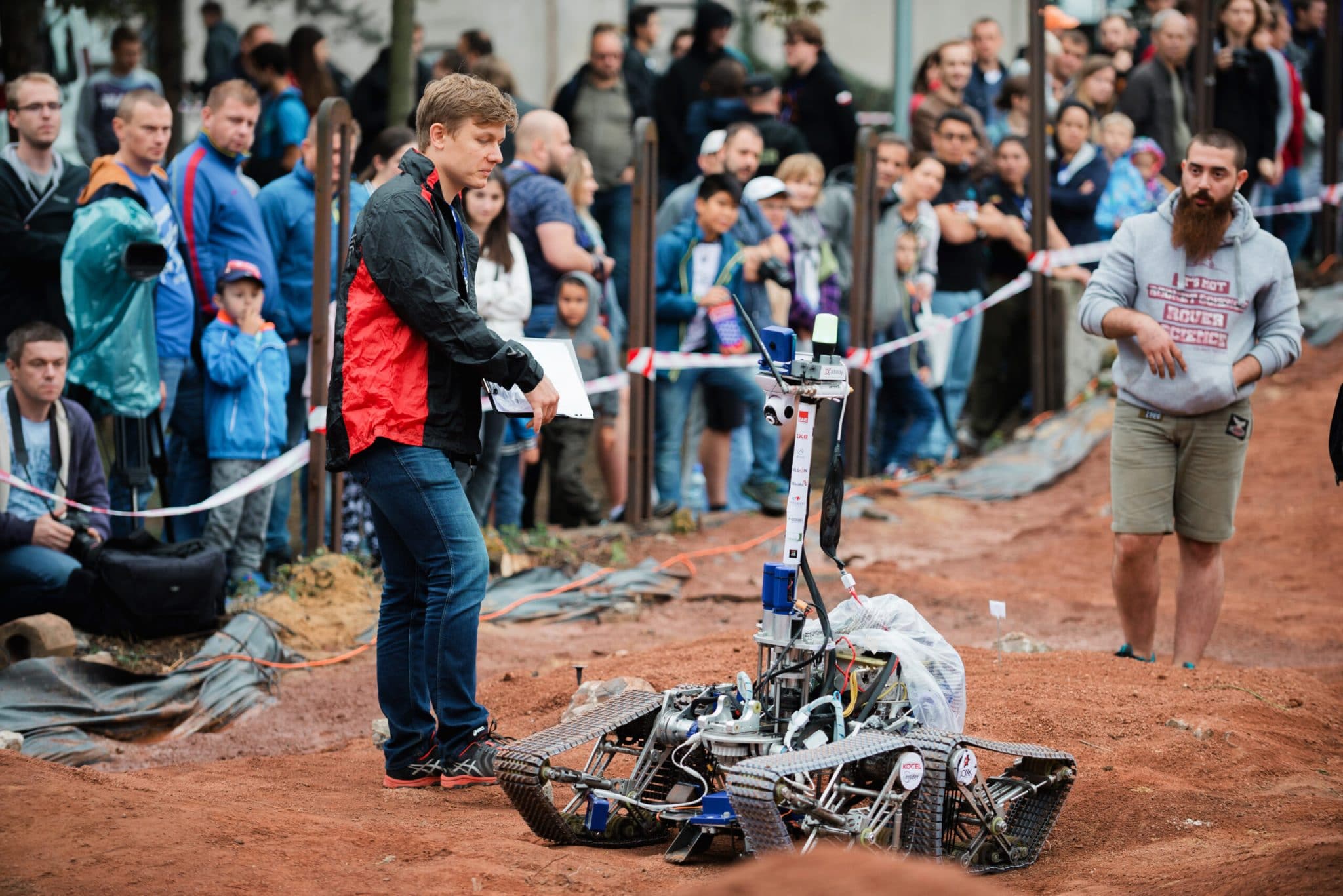Recruitment to the 5th edition of the European Rover Challenge has been completed – as many as 56 teams from 16 countries and 6 continents have applied to participate in the competition this year. The best teams will compete for a place on the podium during the finals which will take place between 13 and 15 September 2019 on the Kielce University of Technology campus. The challenge enjoys increased interest from companies and institutions operating within the international space sector, including PERASPERA – the European Space Robotics Cluster.

– Participation of European teams in the challenge is growing. This year they constitute 60% of all applications. We have 17 completely new teams from all over the world. They also include those who attended the ERC 2018 as viewers in order to prepare for the challenge this year – says Magda Worytko, European Rover Challenge International Teams Coordinator – We note that the challenge gains international recognition. High level of tasks that the teams face makes them verify their skills more carefully already at the stage of submitting their initial documentation. More and more often applications are sent by teams that have experience in participating in various robotics challenges around the world – she adds.
For the teams participation in the project and the ERC finals is a great opportunity to extend universities’ programme requirements to practical experience in making documentation compliant with the requirements of NASA and ESA, solving technical challenges that the teams have to face and solve on the spot as well as mastering their skills and competencies. As a result, every year graduates and young engineers complete more advanced projects. It is with them in mind that in the previous edition of ERC the organisers created the ERC Pro formula which will be continued this year.
The formula is also addressed to start-ups, companies, research groups and people working in the broader field of robotics. The ERC Pro formula gives young professionals unique possibilities both due to mutual inspiration regarding innovative solutions in space technologies, robotics, automation, etc. as well as support in starting international cooperation, presenting their constructions to potential investors or commercialising some technological solutions. For the university teams this is an opportunity to have a direct contact and talk to more experienced teams and specialists. The challenge also enjoys increased interest from companies and institutions operating in the international space sector, including the PERASPERA Cluster. The recruitment of projects in the ERC Pro formula is still open.
Recruitment of exhibitors to the Scientific and Technological Show Zone has also started. It is dedicated to everyone who want to find out more about the space, space-related technologies, robotics as well as their significance and possibilities of practical application in various spheres of life, including the industry, medicine, agriculture or education.
The 5th edition of the ERC will also be accompanied by a conference attended by representatives of the world of science and business from Poland and abroad as well as mentoring and business workshops for the teams.
The European Rover Challenge 2019 is co-organised by the European Space Foundation, Mars Society Polska, Starachowice Special Economic Zone and the Kielce University of Technology.
The event is organised under the honorary patronage of the European Space Agency, Ministry of Science and Higher Education, Ministry of Foreign Affairs, Polish Space Agency and Świętokrzyskie Province Marshal. The event partners have also been joined by Mathworks and Austrian Space Forum (OeWF).

The full list of registered teams:
| Team name | University affiliation | Country |
| µRoboSpace | Poznan University of Technology | Poland |
| A.R.E.S. | Netaji Subhas University of Technology | India |
| AGH Space Systems | AGH University of Science and Technology | Poland |
| Alma-X | University of Bologna – Alma Mater Studiorum | Italy |
| Ancha Space Technologies | Basaksehir Living Lab (an Incubation Center – http://basaksehir-livinglab.com/BLL/home/) | Turkey |
| ARGO | Bialystok University of Technology | Poland |
| ASTRA (Amrita Vishwa Vidyapeetham) | Amrita Vishwa Vidyapeetham | India |
| Astra Robotics (RV College of Engineering) | RV College of Engineering | India |
| AUST Little Step | Ahsanullah University of Science and Technology | Bangladesh |
| BLUEsat | University of New South Wales (UNSW) | Australia |
| BRACU Mongol-Tori | BRAC University | Bangladesh |
| Cocodile Rover | West Pomeranian University of Technology (ZUT) | Poland |
| Continuum | University of Wrocław | Poland |
| D.I.A.N.A. | Polytechnic University of Turin | Italy |
| Ekush | Military Institute of Science and Technology | Bangladesh |
| FRoST – Frankfurt Robotic Science | Frankfurt University of Applied Sciences | Germany |
| Fupla | Kielce University of Technology | Poland |
| Hacettepe Rover | Hacettepe University | Turkey |
| IMPULS | Kielce University of Technology | Poland |
| Interplanetar | BANGLADESH UNIVERSITY OF ENGINEERING AND TECHNOLOGY(BUET) | Bangladesh |
| ITU Rover | Istanbul Tech | Turkey |
| IUT Avijatrik | Islamic University of Technology | Bangladesh |
| IUT Mars Rover | Islamic University of Technology(IUT) | Bangladesh |
| Kameleon | Opole University of Technology | Poland |
| KNR | Warsaw University of Technology | Poland |
| Legendary Rover | Rzeszow University of Technology, Rzeszow | Poland |
| LU_Durbar | Leading University | Bangladesh |
| ManSEDS | University of Manchester, UK | United Kingdom |
| MarsWorks | The University of Sheffield | United Kingdom |
| MISC | University of Stavanger | Norway |
| MWT Robotics | Alexandria University | Egypt |
| NSU Mars Ex | North South University | Bangladesh |
| Ogrodoot | Rajshahi University of Engineering & Technology | Bangladesh |
| Orion | Lublin University of Technology | Poland |
| OU Planetary Robotics Students | Open University | United Kingdom |
| OzU Rover | Ozyegin University | Turkey |
| PCz Rover | Czestochowa University of Technology | Poland |
| Pioneers | Nicolaus Copernicus University in Toruń | Poland |
| Project Scorpio | Wroclaw University of Science and Technology | Poland |
| Raptors | Lodz University of Technology | Poland |
| Reactor | Pontificia Universidad Católica del Perú Universidad de Lima Universidad Nacional Agraria La Molina |
Peru |
| Robocol | Universidad de los Andes | Colombia |
| Robotics for Space Exploration (RSX) | University of Toronto | Canada |
| RoverOva | TU Ostrava | Czech Republic |
| SEDS Sri Lanka – Robotics and Rover Division | Sri Lanka | |
| SEDS VIT | Vellore Institute of Technology | India |
| Silesian Phoenix | Silesian University of Technology | Poland |
| SKA Robotics | Warsaw University of Technology | Poland |
| Sooner Rover | University of Oklahoma | USA |
| Space Concordia – Robotics Division | Concordia University | Canada |
| Ten In Black | Mansoura University | Egypt |
| UASK ROVER | Yıldız Technical University | Turkey |
| UCL Rover | University College London | United Kingdom |
| University of Warsaw Rover | University of Warsaw | Poland |
| VDESIGN | Państwowa Wyższa Szkoła Zawodowa im. Stanisława Pigonia w Krośnie | Poland |
| WARR Exploration | Technical University Munich – Chair of Astronautics | Germany |

